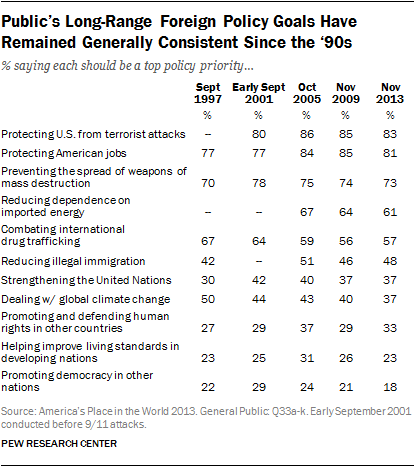
The long-range foreign policy priorities of the American public have remained largely consistent since the 1990s – a period covering three presidencies, two major wars and the worst terrorist attack in the nation’s history.
Fully 83% say that taking measures to protect against terrorist attacks should be a top priority of the United States. This is little changed from the most recent America’s Place in the World surveys in 2009 (85% top priority) and 2005 (86%).
Even in September 2001, before the 9/11 terrorist attacks, 80% rated protecting the nation from terrorism as top priority.
Protecting American jobs also continues to be one of the public’s leading policy goals. Currently, 81% rate protecting U.S. jobs as a top priority, which has remained stable since the 1990s. Nearly three-quarters of Americans (73%) say that preventing the spread of weapons of mass destruction should be a top long-range policy objective.
About six-in-ten (61%) say that reducing U.S. dependence on imported energy sources is a top priority, which is slightly lower than 2005 (67%). And (57%) say the same of combatting international drug trafficking; that is little changed from recent years, though 10 points lower than in the 1997 America’s Place in the World survey.
Currently, 48% say that reducing illegal immigration should be a top foreign policy priority, compared with 46% in 2009 and 51% in 2005. Nearly four-in-ten (37%) cite strengthening the United Nations as an important objective, which has little changed from 2009 (37%) and 2005 (40%), and is slightly lower from 2001 (42%). About as many (37%) say that dealing with global climate change should be a top priority, which has declined from 50% in 1997.
The goals rated lowest by the public are promoting human rights in other countries (33% top priority), helping improve the living standards in developing nations (23%) and promoting democracy in other nations (18%). These objectives have never been viewed as important by most Americans, though in the early September 2001 survey, 29% said promoting democracy abroad should be a top policy priority.
CFR Members’ Policy Priorities
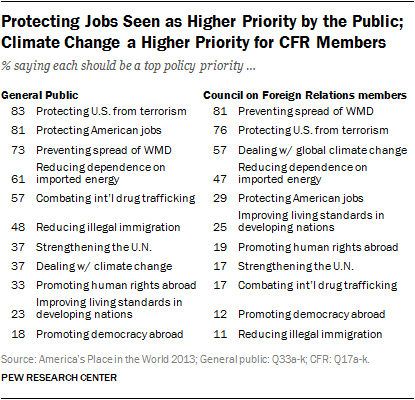
The long range policy goals of Council on Foreign Relations members are similar to the public’s in several respects. Large percentages of CFR members rate preventing the spread of weapons of mass destruction (81%) and protecting the U.S. from terrorism (76%) as top policy priorities.
And CFR members, like the public, view improving living standards in developing countries (25%), and the promotion of human rights (19%) and democracy (12%) as much lower policy priorities.
However, a much higher percentage of the public (81%) than CFR members (29%) say that protecting American jobs should be a top priority of the nation’s foreign policy. Conversely, a majority of CFR members (57%) rate dealing with climate change as a top priority, compared with 37% of the public.
Reducing illegal immigration and strengthening the U.N. are much higher priorities for the public than CFR members. About half of the public (48%) says that reducing illegal immigration should be a top priority and 37% say the same of strengthening the U.N. Among CFR members, just 11% see reducing illegal immigration as a top policy objective and just 17% rate strengthening the U.N. as a top priority.
Wide Partisan Differences over Climate Change, Illegal Immigration
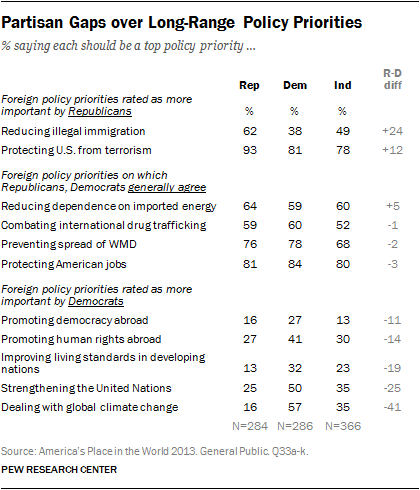
There continue to be wide partisan disagreements over the importance of a number of foreign policy priorities. More than three times as many Democrats (57%) as Republicans (16%) say that dealing with global climate change should be a top foreign policy priority. This reflects the deep partisan divide over whether there is solid evidence that the earth is warming.
And while goals such as strengthening the U.N., improving living standards in developing countries, and promoting human rights and democracy are not among Democrats’ leading priorities overall, more Democrats than Republicans view each as top policy goals.
By contrast, reducing illegal immigration is rated as much more important by Republicans than Democrats. About six-in-ten (62%) Republicans say that reducing illegal immigration is a top foreign policy objective, compared with 49% of independents and just 38% of Democrats. In addition, protecting against terrorism is viewed as top priority by more Republicans (93%) than Democrats (81%) or independents (78%).
The Israeli-Palestinian Conflict
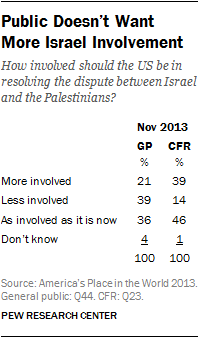
When it comes to resolving the dispute between Israel and the Palestinians, nearly as many say the U.S. should be less involved (39%) as say it should be as involved as it currently is (36%). About one-in-five (21%) say the U.S. should be more involved in resolving this dispute.
By comparison, 46% of CFR members say the U.S. should be as involved as it currently is, closely followed by 39% who would like the U.S. to be more involved; just 14% want less U.S. involvement in the Israeli-Palestinian conflict.
Opinions about U.S. involvement in resolving the dispute between Israel and the Palestinians do not vary widely across party lines. However, Tea Party Republicans are considerably more likely than non-Tea Party Republicans to favor a greater role for the U.S.; 38% of Republicans and Republican-leaning independents who agree with the Tea Party say the U.S. should be more involved in resolving the Israeli-Palestinian conflict, compared with 21% of Republicans and GOP-leaners who do not agree with the Tea Party.
Stability vs. Democracy
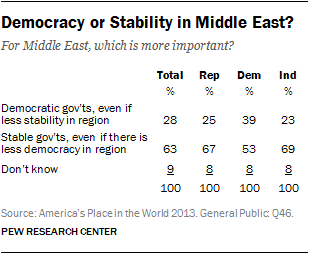
Regarding the political situation in the Middle East, about six-in-ten Americans (63%) say stable governments are more important, even if there is less democracy in the region; fewer expressed this view in 2011 (52%) and 2012 (54%). Just 28% say democracy is more important than stability in the Middle East.
While the balance of opinion among all partisan groups is in favor of stable governments, Democrats are more likely than Republicans and independents to endorse democracy over stability; 39% of Democrats say democratic governments are more important, compared with 25% of Republicans and 23% of independents.




